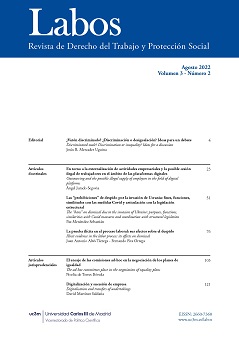Salary devaluation remains
analysis of the 2021 labor reform from a salary perspective in a context of runaway inflation and proposals for change
Abstract
Despite the labor reform of 2021, the main effect of the 2012 reform is still fully in force: that is, the loss of purchasing power of working people is maintained. Given this scenario, it is worth asking i) whether it currently makes sense to continue to persist in wage devaluation as a way of obtaining competitiveness and economic growth; ii) what legal mechanisms are still in force today that are causing this wage devaluation; iii) what can be done about it.
With this triple objective, this article analyzes what were the arguments for wage devaluation in 2012 (increasing competitiveness) and its effects, in order to compare them with the arguments that are currently held to maintain wage devaluation (fear of second round inflation). The aim is to understand whether it makes economic sense to persist with the policy of reducing real wages. In addition, we analyze the current regulations that, after the 2021 reform, allow the maintenance of low wages and cost competition. Against this backdrop, a series of regulatory proposals are made with the aim of reversing wage devaluation. Specifically, in addition to what measures are necessary, we study how to design the proposed regulatory changes to avoid a possible second round inflation.
Downloads
Copyright (c) 2022 LABOS Revista de Derecho del Trabajo y Protección Social

This work is licensed under a Creative Commons Attribution-NonCommercial-NoDerivatives 4.0 International License.
Loa autores ceden a la Revista Labos los derechos de reproducción y distribución, así como cualquier forma de explotación del trabajo.




